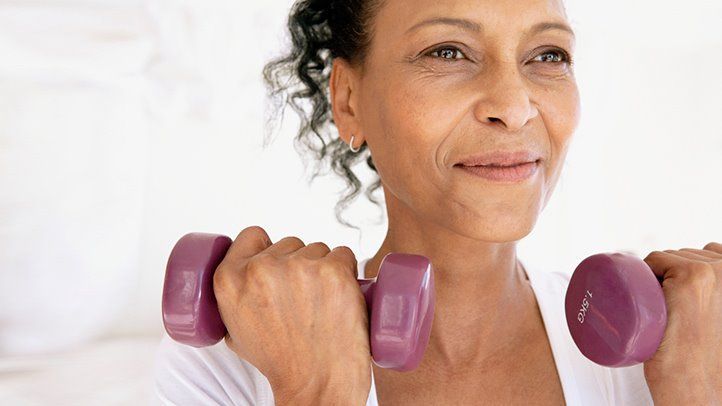[ad_1]
Once you hit your 50s, a combination of factors makes it all too easy to pack on the pounds. If you’re like most women, your metabolism has dropped to its lowest point ever and hormonal changes have brought on menopause. You may be experiencing hot flashes, night sweats, insomnia, and yes, weight gain.
Unfortunately, the weight most women put on during menopause tends to be belly fat, notes a 2012 review of studies published in Climacteric, the International Menopause Society’s journal. And that’s not something to ignore since fat around your middle has been shown to raise your risk for cardiovascular disease.
“Your 50s are a really important age for you to look at yourself and make changes that you may not have had the chance to make when you were younger,” says Sylvia Garcia, MD, a family practice physician at Presbyterian Intercommunity Hospital in Whittier, California. In other words, it’s not too late to adopt healthy habits. Use these tips to win at weight loss in your 50s.
1. Don’t be afraid of the scale. Many women don’t want to be weighed when they visit the doctor but it’s crucial to step on the scale anyway, says Dr. Garcia. It’s important to know if you’ve gained weight so you can discuss with your doctor what may be causing the extra pounds and how you can get rid of them. Your doctor may have some creative solutions that you’ve never thought of.
2. Cut back on calories. When you’re in your 50s, your metabolism slows down considerably, and that means every bite counts. To fend off extra pounds, a good rule of thumb is to consume about 200 fewer calories a day than you normally would, suggests the Academy of Nutrition and Dietetics. This will keep your sluggish metabolism from getting the best of you.
3. Keep a food log. Tracking what you eat on a daily basis can increase your awareness of how much you’re consuming – and that can help reduce mindless munching. There are many free apps you can download on your phone that make it easy to record every bite. “Just be sure to enter your intake in real time while you’re eating, rather than at the end of the day by recall,” says Debra Anne DeJoseph, MD, an internist at University Hospitals in South Euclid, Ohio. If you wait until later, you’ll be less likely to accurately enter your foods.
4. Give meatless Mondays a try. In addition to helping you lose weight, eating a vegetarian meal at least once a week will reduce your saturated fat intake, which can protect you from chronic conditions like heart disease, according to the Academy of Nutrition and Dietetics. On days when you decide to go meatless, center your meal around vegetables and add beans or lentils to make sure you’re getting enough protein.
5. Keep moving. Muscle loss begins in your 40s and will continue unless you make an effort to be physically active. Aerobic exercise like walking, biking, and swimming can help keep you fit but strength training is the key to fighting muscle loss, according to the International Osteoporosis Foundation. “Your goal is to maintain your muscle mass,” says Dr. DeJoseph. So don’t worry about trying to gain muscle like you did when you were younger.
6. Treat menopause symptoms. The drop in estrogen during menopause can bring on hot flashes, night sweats, insomnia, and other symptoms. Hormone therapy prescribed by your doctor can help improve your sleep and anxiety, and in turn improve your eating habits, says Garcia. Estrogen therapy can also help prevent abdominal weight gain during menopause, according to the Climacteric review. Hormone therapy carries risks, however, so talk to your doctor about whether it’s right for you.
7. Manage your medications. Some of the prescriptions you take on a regular basis can contribute to weight gain, says Robert Ziltzer, MD, an obesity medicine physician at Scottsdale Weight Loss Center in Scottsdale, Arizona. “Many blood pressure, diabetes, and antidepressant medications either reduce metabolism or increase hunger,” he says. If you think your meds are causing you to pack on the pounds, talk to your doctor about alternative treatments you can try.
8. Get your thyroid checked. One in eight women has a thyroid disorder, according to the North American Menopause Society. And an underactive thyroid, known as hypothyroidism, has symptoms that mimic menopause – including weight gain. If you’ve been feeling extra tired and have put on weight recently, it might be worth asking your doctor to run a blood test to see if you have a thyroid disorder. He or she can prescribe hormone balancing medications that will help you manage your symptoms.
9. Find time to relax. Financial concerns, aging parents, and career pressures in your 50s may be leaving you stressed out — and all that worry can affect how you eat and exercise. “This is a really important time for women to look at their stressors,” Garcia says. Though you can’t remove stress completely from your life, you can find ways to manage it. Garcia recommends practicing relaxation techniques such as guided imagery, which involves simply closing your eyes and visualizing something you enjoy such as taking a walk on the beach.
10. Stay motivated. “We all go through periods where we are more driven than other times to lose weight,” Garcia says. As your motivation ebbs and flows, don’t give up: You might not feel inspired to eat right and exercise today, says Garcia, but tomorrow is a new day and another opportunity to make healthy choices.
[ad_2]
This article was originally published by a www.everydayhealth.com . Read the Original article here. .


